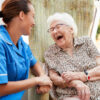Do the senior loved ones in your life get regular exercise? Many older adults enjoy walking or water aerobics, and those can be good exercise. However, federal guidelines also address the role of strength training for all adults. In fact, those guidelines state that most adults should get 150 minutes of moderate activity a week, in addition to at least two strength-building sessions.
Here are a few reasons why strength training is important for older adults:
- You lose muscle mass with age. In fact, by age 70, the typical adult has lost 25% of his or her muscle mass, according to the trainer website ISSA. Strength training can prevent the loss of some of this muscle mass.
- Metabolism decreases with age could lead to weight gain. Strength training, along with cardio activity and healthy eating habits, can help counteract this.
- Strength training can help reduce the risk for falls and fractures.
- Strength training will help you keep up your endurance and maintain balance.
- Strength training and other forms of physical activity can help improve your mood and your overall health.
5 Tips for Better Strength Training for Older Adults
If your senior loved one is new to strength training, always check first with a health care provider to make sure it’s OK to proceed with any new physical activity. Beyond that, here are several more tips to get a good strength training program underway:
1. Consider working with a personal trainer. Because everybody and every body is different, generic advice may not always work. Your loved one may be relatively active but strayed away from strength training only recently. Or, you could have someone in your life who never has done strength training. For these reasons, a good certified personal trainer can provide tailored advice. If you’re worried about the cost, shop around. Gyms sometimes have special offers (especially to attract customers back after many shutdowns in 2020), or you may score a discount if the trainer works with a small group of clients at one time.
2. Always include a rest day. If you’re senior loved one is getting started, two days of strength training a week is ideal, with a rest day in between. This gives the muscles the chance to recover.
3. Look for a routine that hits a range of muscles, including arms, back, abs, shoulders, chest, hips, and legs. Some people like to have days where they focus more on their upper body and days where their lower body is more of a concern.
4. Encourage your senior loved one to try different strength training options if they can do so. There are actually many choices involved with strength training, including:
- Barbells
- Dumbbells
- Kettlebells
- Using their own body weight for resistance
- Weight machines
If they are physically fit enough to explore different options, encourage them to see which option(s) they enjoy the most.
5. Learn proper form. Injuries can easily happen if someone doesn’t know how to use strength training equipment. This is another great reason to work with a personal trainer. If that’s not possible, help your senior loved one find videos online that can teach good form.
Call Secure Aging to Find Out How We Can Help Seniors With Care Management
At Secure Aging in Bradenton, we transform the weight of the world into a sigh of relief for our senior clients and their concerned family members. The mission of Secure Aging is to protect and preserve our client’s independence and dignity through careful and thoughtful financial and care management. As our clients age, it is their desire to remain independent and age with dignity. Our services protect our clients from talented con artists looking to exploit and deplete the financial resources of our vulnerable seniors. Secure Aging helps families in Manatee County and Sarasota County and in and around the communities of Anna Maria, Bradenton, Bradenton Beach, Ellenton, Holmes Beach, Lakewood Ranch, Longboat Key, Myakka City, Palmetto, Parrish, and Sarasota. Call us at 941-761-9338, or visit us online at www.secureaging.com.



















